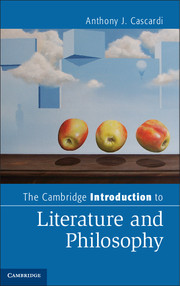Book contents
- Frontmatter
- Contents
- Acknowledgments
- Introduction
- Part I Questions of Truth and Knowledge
- Part II Questions of Value
- Chapter 5 Values, Contingencies, Conflicts
- Chapter 6 Reason and Autonomy, Imagination and Feeling
- Chapter 7 Forces and the Will
- Chapter 8 Opacity
- Part III Questions of Form
- Afterword Limits
- Glossary of Keywords
- Notes
- Index
- References
Chapter 5 - Values, Contingencies, Conflicts
Published online by Cambridge University Press: 05 June 2014
- Frontmatter
- Contents
- Acknowledgments
- Introduction
- Part I Questions of Truth and Knowledge
- Part II Questions of Value
- Chapter 5 Values, Contingencies, Conflicts
- Chapter 6 Reason and Autonomy, Imagination and Feeling
- Chapter 7 Forces and the Will
- Chapter 8 Opacity
- Part III Questions of Form
- Afterword Limits
- Glossary of Keywords
- Notes
- Index
- References
Summary
In considering questions of truth across the dual spans of literature and philosophy we’ve already come to see how truth is virtually impossible to discern without taking questions of value on board. The same holds true for questions of value, which are likewise entangled with truth. The combined insight of these positions resonates with an argument put forward by Hilary Putnam that “factual description and valuation can and must be entangled.” In crystallizing the fact-value connection Putnam was refuting the strong version of the fact-value distinction. We glimpsed the kernel of that distinction in the form of David Hume’s assertion that there can be no way to move from the realm of facts (“is”) to the realm of value (“ought”). But Putnam and others suggest that there is hardly a truth known to man that does not imply some kind of value (including the value of knowing it as a truth). The notion of “truthfulness” as explained by Bernard Williams articulates one form of the value of truth, but it is only one. Moreover, the kinds of value questions that span literature and philosophy are hardly limited to questions of truth. Questions of value don’t require that we first ask about truth. Value questions emerge as prominent in their own right throughout the history of literature as well as in the work of philosophers as different as Plato, Aristotle, Kant, Schopenhauer, and Nietzsche. And yet none of them was inclined simply to relinquish their interest in matters of truth.
- Type
- Chapter
- Information
- The Cambridge Introduction to Literature and Philosophy , pp. 61 - 78Publisher: Cambridge University PressPrint publication year: 2014

